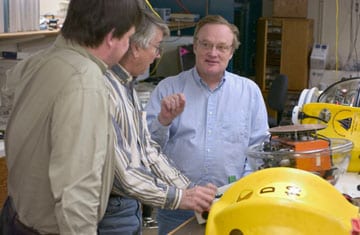Detrick Appointed to WHOI Marine Facilities and Operations Post
April 5, 2004
Senior Scientist Robert Detrick has been appointed Vice President for Marine Facilities and Operations at Woods Hole Oceanographic Institution (WHOI), effective July 1, 2004.
Detrick assumes the post following the retirement June 30 of Richard Pittenger, who has served as Vice President for Marine Operations at WHOI for nearly14 years. During his tenure, the conversions to Research Vessels Knorr and Oceanus were completed, and the Research Vessel Atlantis II was sold and retired, replaced by the new Research Vessel Atlantis. The Deep Submergence Vehicle Alvin became fully subscribed, and the tethered submersibles Argo, Medea/Jason and DSL-120 have been integrated into the U.S. National Deep Submergence Facility. On March 29, the Institution’s new 60-foot coastal research vessel, R/V Tioga , was christened and launched. Pittenger will continue to advise the Institution on the transition to the next generation of research vessels.
Detrick will have responsibility for developing and managing a strategic plan for the integration of the Institution’s research fleet with undersea vehicles and ocean observatories.
“Ships are, and will remain, essential platforms for oceanographic research, but new technologies for exploring and studying the oceans have emerged,” said WHOI President and Director Robert Gagosian. Access to the sea and the deep sea floor is being expanded by advances in submerged vehicle technology, including human-occupied vehicles (HOVs), remotely operated vehicles (ROVs) and, most recently, autonomous underwater vehicles (AUVs).
“Perhaps most significantly, we are on the threshold of the first large-scale deployment of ocean observing systems to understand longer term natural and human-induced change in the oceans on time scales of decades or longer,” Gagosian said of the need for the newly expanded position. “It is an exciting time in ocean sciences research, and Bob’s perspective will help us address these challenges.
A marine geophysicist and Ph.D. graduate of the MIT/WHOI Joint Program in Oceanography and Oceanographic Engineering, Detrick brings a variety of experiences to the newly expanded position. He joined the WHOI staff in 1991 as a Senior Scientist after 13 years as a professor and scientist at the University of Rhode Island. He was a postdoctoral research investigator at WHOI in 1978 and 1979, and worked briefly as an exploration geophysicist for Standard Oil Company of California from 1974 to 1975. He received a bachelor’s degree in geology and physics from Lehigh University in 1971 and a master’s degree from the University of California, San Diego in marine geology in 1974.
Detrick recently chaired the National Academy of Sciences Committee on Implementation of an Ocean Observatory Network for Research. He is currently Chair of the WHOI Geology and Geophysics Department, Chair of the Board of Governors of the Joint Oceanographic Institutions, which is the implementing organization responsible for US participation in the new International Ocean Drilling Program, and Chair of the National Science Foundation’s Geosciences Advisory Committee. He has participated in 28 research cruises, 17 as chief scientist.
Pittenger, a career naval officer with a number of leadership and military experience tours, served as Director of Antisubmarine Warfare Division in the Office of the Chief of Naval Operations from 1986 to 1988 and as Oceanographer of the Navy from 1988 to 1990. He retired after 37 years in the Navy with the rank of Rear Admiral in 1990 and joined the WHOI staff as Arctic Research Coordinator in November 1990. He was named Associate Director, and later Vice President, of Marine Operations in March 1991.
Woods Hole Oceanographic Institution is a private, independent, not-for-profit corporation dedicated to research and higher education at the frontiers of ocean science. Located in Falmouth, MA, its primary mission is to understand the oceans and their interaction with the Earth as a whole, and to communicate a basic understanding of the ocean’s role in the changing global environment. Established in 1930 on a recommendation from the National Academy of Sciences, the Institution is organized into five departments, interdisciplinary institutes and a marine policy center, and conducts a joint graduate education program with the Massachusetts Institute of Technology.

